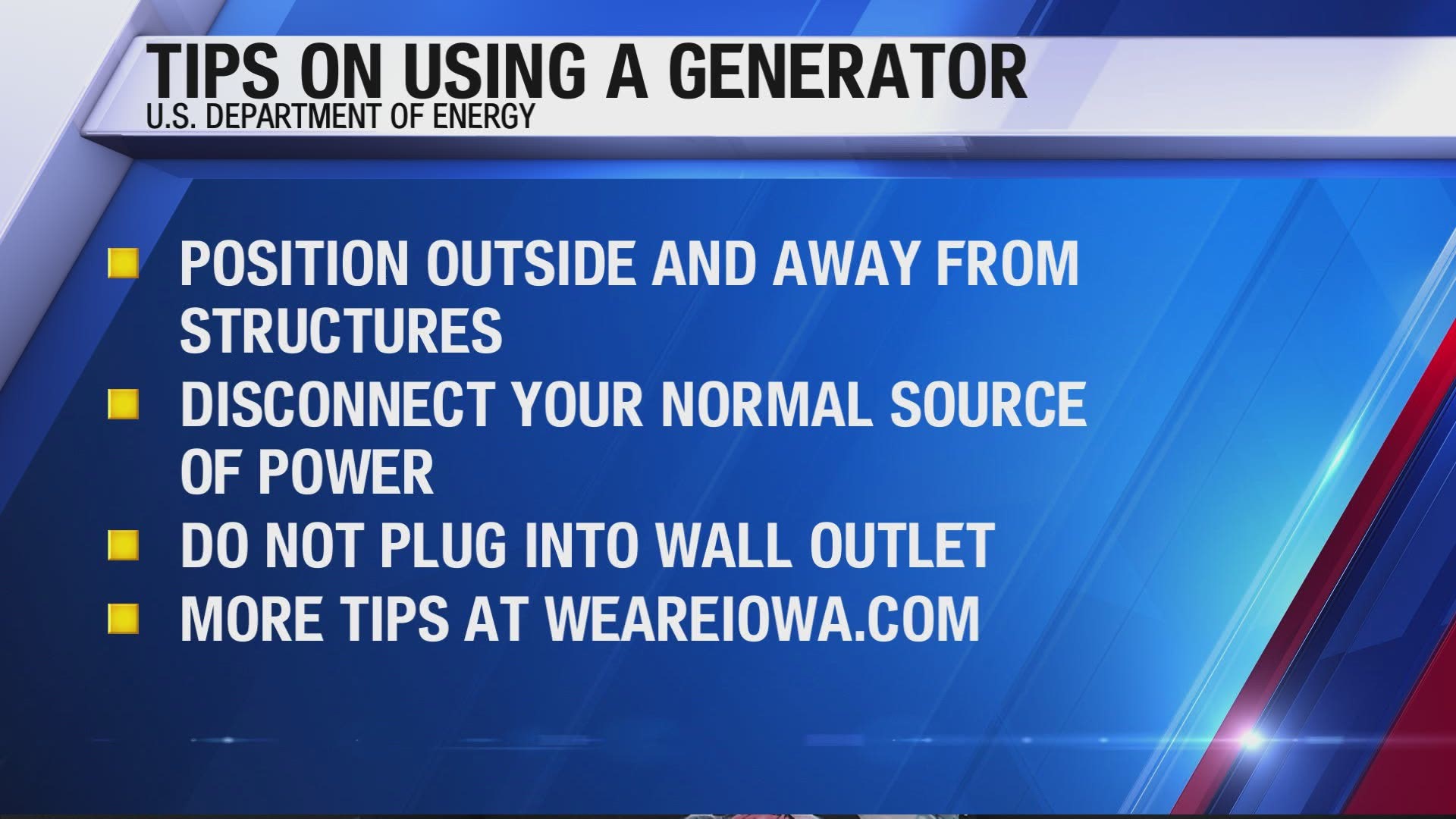IOWA, USA — More than 200,000 MidAmerican Energy customers are still without power Tuesday morning following Monday afternoon's severe weather. The company says to be patient and whatever you do, do not touch downed power lines.
You can view the current outage map here.
It could still be days before all Iowans' power is restored. So, are you wondering how to keep your food safe in a power outage? The U.S. Food and Drug Administration has some tips.
Before a power outage:
- Put appliance thermometers in your refrigerator and freezer. You can also freeze containers of water and gel packs to help keep food cold if the power goes out.
- Keep your freezer temperature below or at zero degrees Fahrenheit, and you refrigerator at or below 40 degrees Fahrenheit.
- Make sure you group foods together in the freezer to help food stay colder longer. This includes leftovers, milk, fresh meat and poultry you don’t need right away.
- You can also store nonperishable foods on high shelves to avoid flood water.
- Make sure you have bottled water stored where it will be safe as possible from flooding. If it has an odor, do not drink it and throw it away.
During a power outage:
- Keep refrigerator and freezer doors closed to maintain cold temperatures.
- The FDA said if the doors stay closed, a full freezer will hold its temperature for two days, and one day if it’s half-full.
- A fridge will keep food safe for four hours.
- If you plan to eat refrigerated or frozen meat, poultry, fish or eggs at safe temperatures, it is important to make sure they are thoroughly cooked to a safe minimum internal temperature. According to the FDA, this ensures any food-borne bacteria that may be present are destroyed.
Once power is restored:
- If an appliance thermometer was kept in the freezer, check the temperature. If the temperature reads 40 degrees Fahrenheit or below, the food is safe and may be refrozen.
- If a thermometer was not in the freezer, check each package of food to determine its safety. The FDA said you should not rely on appearance or odor. If food still has ice crystals, or is 40 degrees or below, it is safe to refreeze or cook.
- Refrigerated food should be safe as long as the power was out for no more than 4 hours, and the door was kept shut.
- Throw away any perishable food that has been at temperatures above 40 degrees for more than two hours.
In the aftermath of a storm, a generator is an invaluable piece of equipment but because it's not used often, safety precautions can be overlooked. The U.S. Department of Energy has some tips on how to stay safe.
- Position generators outdoors and well away from any structure. Running a generator inside any enclosed or partially enclosed structure can lead to dangerous and often fatal levels of carbon monoxide. Keep generators positioned outside and at least 15 feet away from open windows.
- Keep the generator dry. Operate your generator on a dry surface under an open, canopy-like structure and make sure your hands are dry before touching the generator. Do not use the generator in rainy or wet conditions.
- Disconnect the power coming into your home/business. Before you operate your generator, disconnect your normal source of power.
- Make sure your generator is properly grounded. Grounding generators can help prevent shocks and electrocutions.
- Plug equipment directly into the generator. Use heavy-duty, outdoor-rated extension cords that are in good working condition and have a wire gauge that can handle the electric load of any connected appliances.
- DO NOT plug the generator into a wall outlet. NEVER try to power your house/business by plugging the generator into a wall outlet or the main electrical panel.
- Turn the generator off and let it cool before refueling. Use the type of fuel recommended in the manufacturer’s instructions.
- Inspect and maintain your generator regularly. Check aboveground storage tanks, pipes, and valves regularly for cracks and leaks, and replace damaged materials immediately.
If you need to report an outage, MidAmerican encourages its customers to call or submit a tip online. You can go here to view the latest outages and see an estimated time when power will be restored.
Download the We Are Iowa app or subscribe to Local 5's "5 Things to Know" email newsletter.
![]()

